Participate in our online survey!
This online survey is part of a study conducted by the WaterProof project partner IZES gGmbH. The aim of the survey is to analyse the public perception of cleaning products based on CO2 from wastewater.
In WaterProof, CO₂ emissions are captured from waste and wastewater treatment plants and transformed into the base chemical formic acid. This chemical can directly be applied as decalcifier in cleaning products.
Your feedback will play a crucial role in shaping the future of environmentally-friendly products and the EU’s circular economy. By sharing your thoughts, you will also be contributing to the success of the WaterProof project.
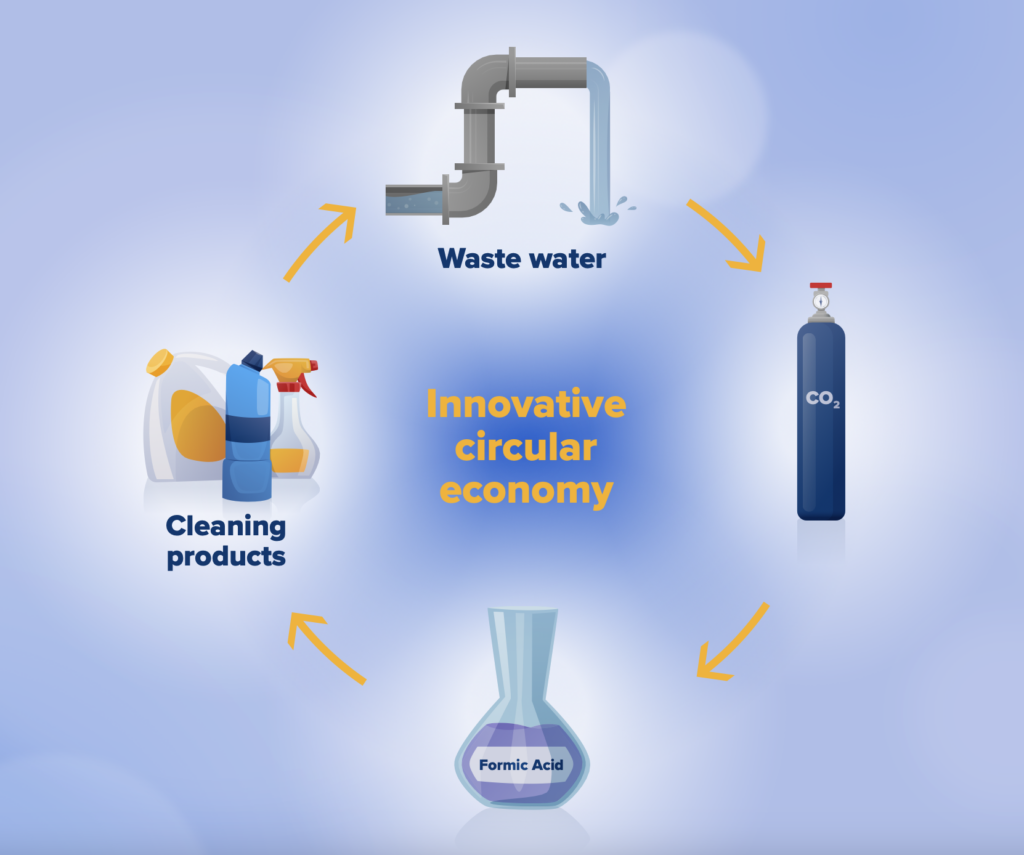
Are you an inhabitant of one of the three following countries? Then click the respective button and fill out this short survey to contribute your opinions!
Latest News
- 04.
Jun 2025Workshop for students and young researchers in Saarbrücken at 17 June 2025 (in German)
In this interactive workshop, students and young researchers from STEM or social sciences will be informed on the importance of interdisciplinary collaboration for sustainable innovation. The workshop is organised by IZES with support by nova-Institute. Students from inside and outside the Universität des Saarlands can register until 12th June 2025.
Content of the workshop:
- Introduction to environmental psychology and transdisciplinary processes in the circular economy using the example of the EU-project WaterProof
- Insight into the methodology of the Social Life Cycle Assessment (S-LCA) with an expert from nova-Institut GmbH
- Interactive simulation game focussing on a sustainable infrastructure project
- Exciting impulses, discussions and exchange with participants from other disciplines
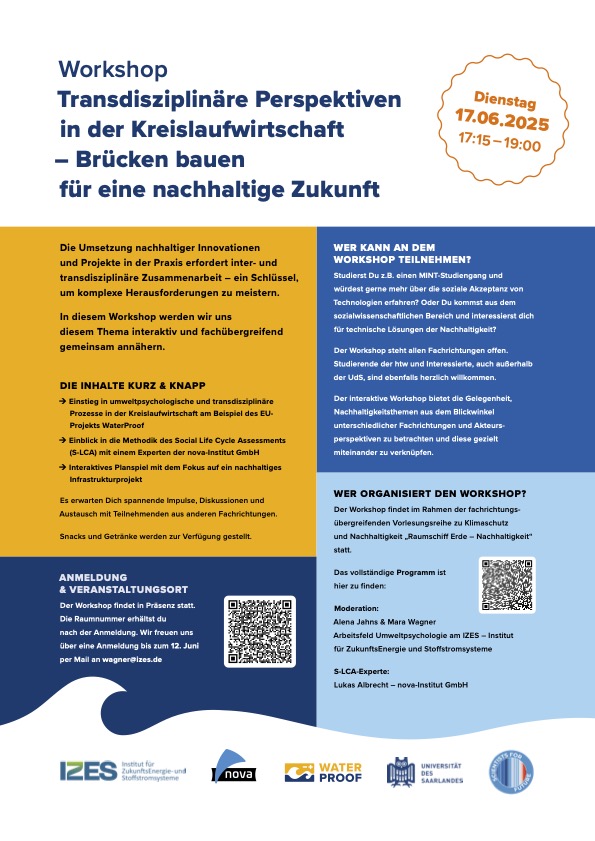
- 16.
Apr 2025Webinar: From Emissions to Innovation: CO₂-Derived Chemicals
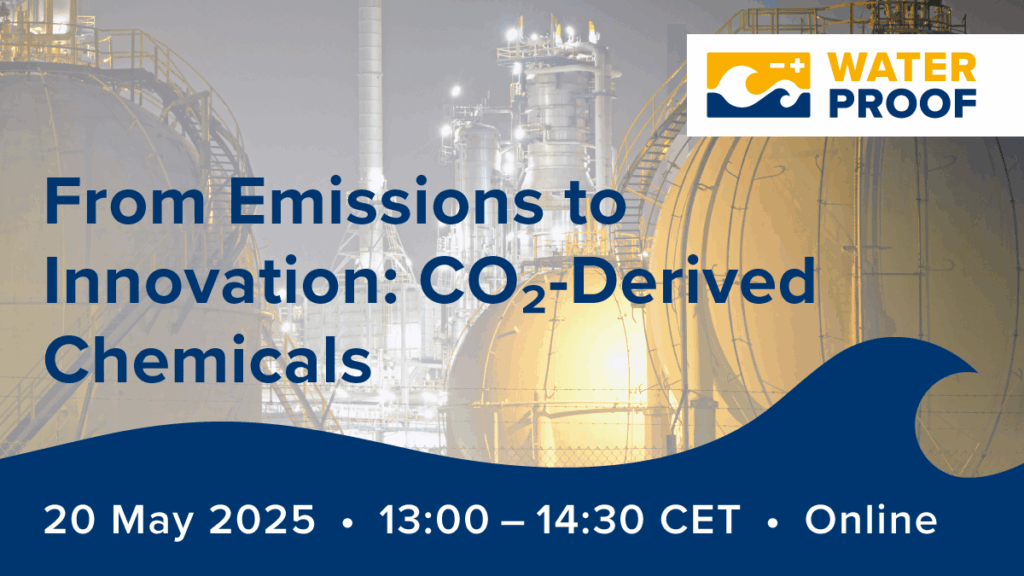
20 May 2025, 13:00-14:30 CET, online and free
Carbon dioxide (CO₂) is known as the main driver of climate change. Yet, CO₂ is increasingly recognised as a promising renewable feedstock for the production of valuable chemicals and fuels. By capturing CO₂ emissions from industrial point sources or directly from the air (direct air capture, DAC) and converting them into essential building blocks, it is possible to reduce reliance on fossil resources from below ground, lower greenhouse gas emissions, and help drive the transition to a circular, climate-neutral economy.
Recent advances and innovations in Carbon Capture and Utilisation (CCU) technologies are making it feasible to transform CO₂ into a wide range of products, ranging from base chemicals to advanced fuels. These innovations are not only closing the carbon loop of the chemical industry (defossilisation) but also enabling the integration of renewable energy and transport fuels (decarbonisation) into chemical processes, further reducing the environmental footprint of these vital industries.
The spectrum of CO₂-derived chemicals and fuels is rapidly expanding thanks to breakthroughs in electrochemical, catalytic, and biotechnological processes. Some of the most promising examples include:
Chemicals such as Methanol, Formic acid, Ethanol, Acetic acid, Urea, Polycarbonates and cyclic carbonates, Organic acids (e.g., carboxylic acids, salicylic acid, malonic acid), Esters and lactones, Aromatics and olefins, Glycerol carbonate.
Fuels such as Synthetic gasoline, diesel, and kerosene, Methane, and E-fuels.
These examples illustrate the broad potential of CO₂ as a renewable carbon source for the chemical and materials industry and the energy sector, supporting the shift towards sustainability and circularity.To explore these exciting developments, the EU-funded research project WaterProof is hosting a webinar titled “From Emissions to Innovation: CO₂-Derived Chemicals” on May 20th, 2025, from 13:00 to 14:30 CET.
The event will bring together leading experts including- Pia Skoczinski (nova-Institute) – Renewable Chemicals from CO₂ – An Overview
- Francesca di Bartolomeo (SINTEF, coordinator PyroCO2 Project) – Pioneering Sustainable CO₂ Conversion to C3 Chemicals and High-Value Lipids for Feed and Food Applications
- Albert Guisasola (Autonomous University of Barcelona (UAB), Vivaldi Project) – Innovative bio-based chains for CO₂ valorisation as added-value organic acids
- Eric Schuler (Avantium, WaterProof Project) – Innovative Chemicals and Sustainable Polymer Solutions from CO₂ and renewable electricity
Attendees will gain insights into the latest CCU technologies, market trends, and applications that are driving the shift towards a circular carbon economy.
Discover how CO₂ is being utilised as a valuable resource and learn about the innovations shaping the future of sustainable chemicals. Register now to be part of this dynamic conversation and help unlock the full potential of CO₂-derived chemicals. - 19.
Feb 2025Webinar on Unlocking CCU Potential Through Electrochemistry
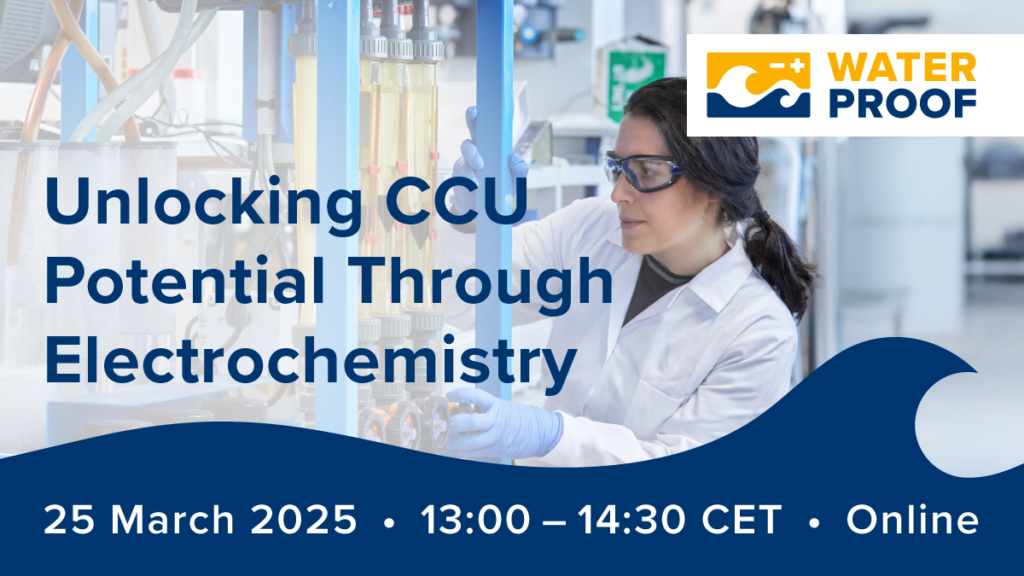
25 March 2025, 13:00-14:30 CET, online and free
Electrochemistry is rapidly emerging as a key technology for Carbon Capture and Utilisation (CCU), offering a sustainable route to transform CO₂ emissions into a valuable resource for the chemical and materials industry. Many valuable chemicals or fuels can be produced from electrochemistry: CO, methane, methanol, formic acid, ethane, ethanol, ethylene, oxalic acid and other hydrocarbons. The development of electrocatalytic CO₂ reduction is progressing, with much interest in commodity chemicals such as ethylene to break down barriers to market entry. This innovative approach promises not only to mitigate climate change but also to reduce industries’ dependence on fossil resources, driving a significant shift towards global sustainability goals.
The WaterProof project invites researchers and industry stakeholders to an insightful webinar. This event will showcase the latest advancements in electrochemical CO₂ conversion and their potential to transform entire industries by making chemical production more sustainable.
The webinar will feature presentations from leading experts
- Patrick Löb (Fraunhofer IMM): Flow reactors for the electrochemical CO2 reduction to formate / formic acid and beyond
- Brian Rawls (Avantium/Volta): Exploration of electrochemical production of CO₂-based polyesters and chemicals, and introduction of the WaterProof project’s technology for electrochemical CO₂ conversion into formic acid.
- Danny Hellebusch (Twelve): VP CO₂ Electrolyzer – Demonstration of Twelve’s revolutionary “industrial photosynthesis” technology, which Twelve has successfully scaled up to transform CO₂ into products ranging from sustainable aviation fuel to car components.
Agenda
13:00-14:10 Patrick Löb (Fraunhofer IMM): Flow reactors for the electrochemical CO₂ reduction to formate / formic acid and beyond
13:20-13:40 Brian Rawls (Avantium/Volta): Exploration of electrochemical production of CO₂-based polyesters and chemicals, and introduction of the WaterProof project’s technology for electrochemical CO₂ conversion into formic acid.
13:40-14:00 Danny Hellebusch (Twelve): Introducing Twelve and showcasing the potential of electrochemical CO₂ conversion by showcasing products we’ve created from jet fuel to car parts
14:00-14:30 Discussion and Q&A
- 14.
Nov 2024NOVA presented WaterProof at the 2. Circular Carbon Economy Summit in Vienna, Austria (12 November 2024)
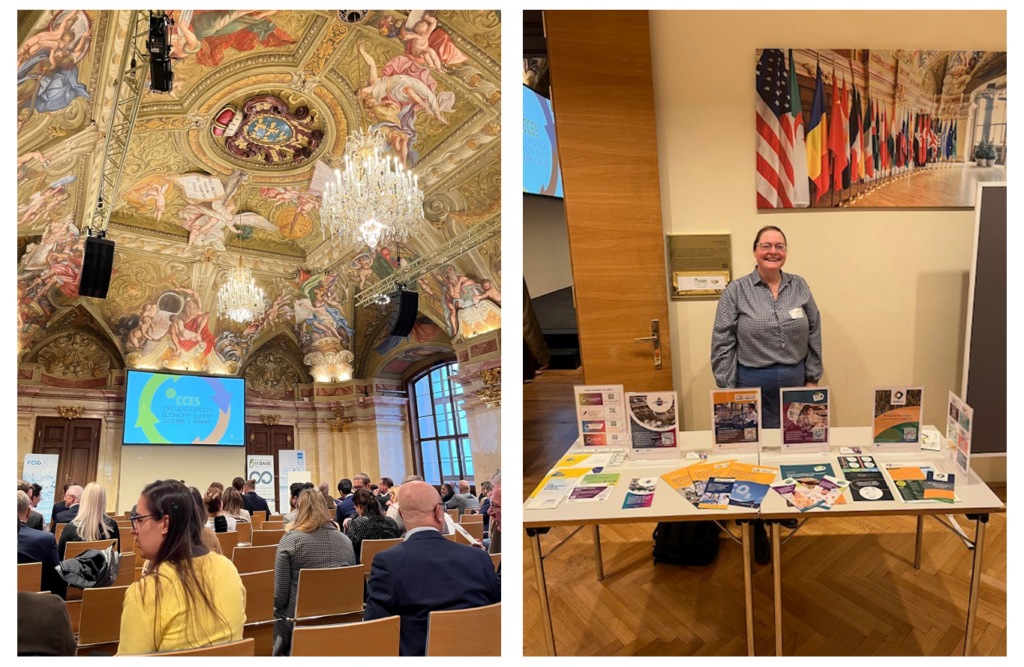
Anke Schwarzenberger from NOVA presented a shared booth with information material, factsheets and flyers of the project WaterProof to an audience of 260 registered participants interested in CO₂-derived and other renewable materials, technologies and innovations.
The summit with the subtitle “Future-orientated management through efficient bioeconomy and circular economy” took place at the beautiful “Palais Niederösterreich” and was hosted by BioBASE GmbH.
- 19.
Sep 2024Stakeholder Perspectives Along the Entire Value Chain – Interview with Alena Jahns and Jan Hildebrand (IZES gGmbH)
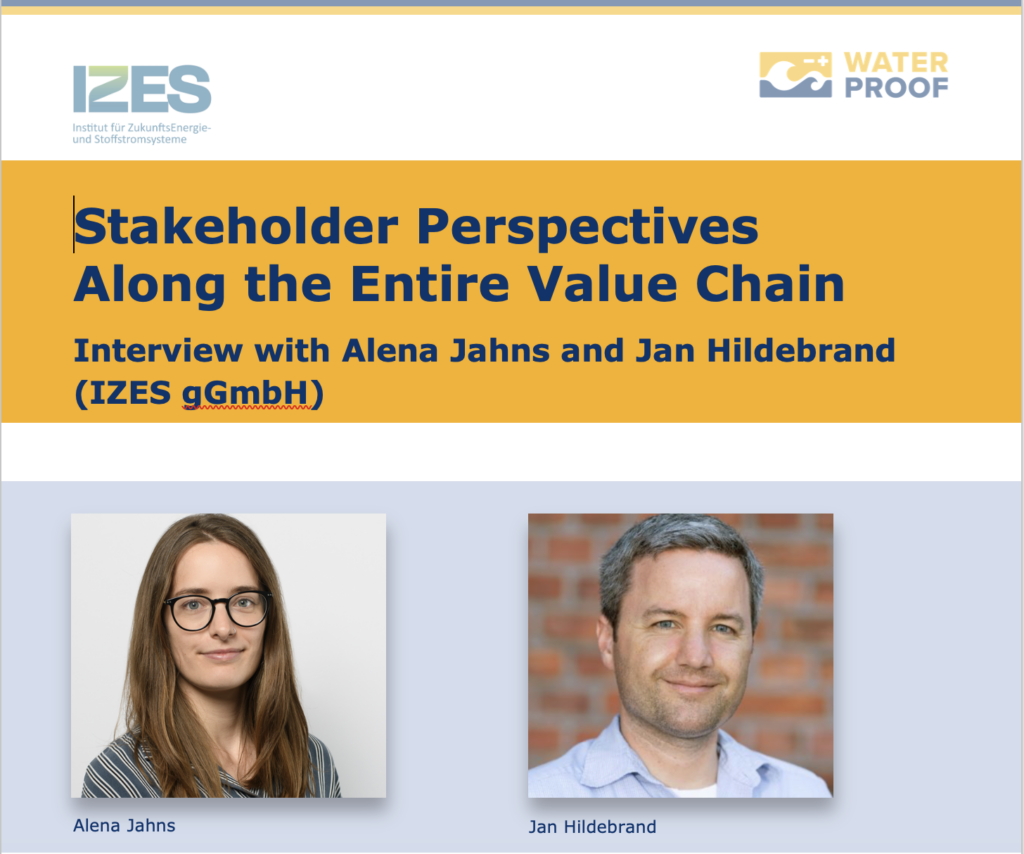
Stakeholder engagement and feedback are indispensable for the success of a project. Also, the views, opinions and perceptions of consumers need to be taken into account for the adoption of CO₂-derived consumer products. Learn more on how IZES’s work will impact the future of sustainable product uptake, particularly in integrating CO₂-derived materials into mainstream consumer goods.
Read the full interview here.
- 27.
Jun 2024Maddalena Bettoni from FUNDITEC presented WaterProof at the MeetechSpain 2024
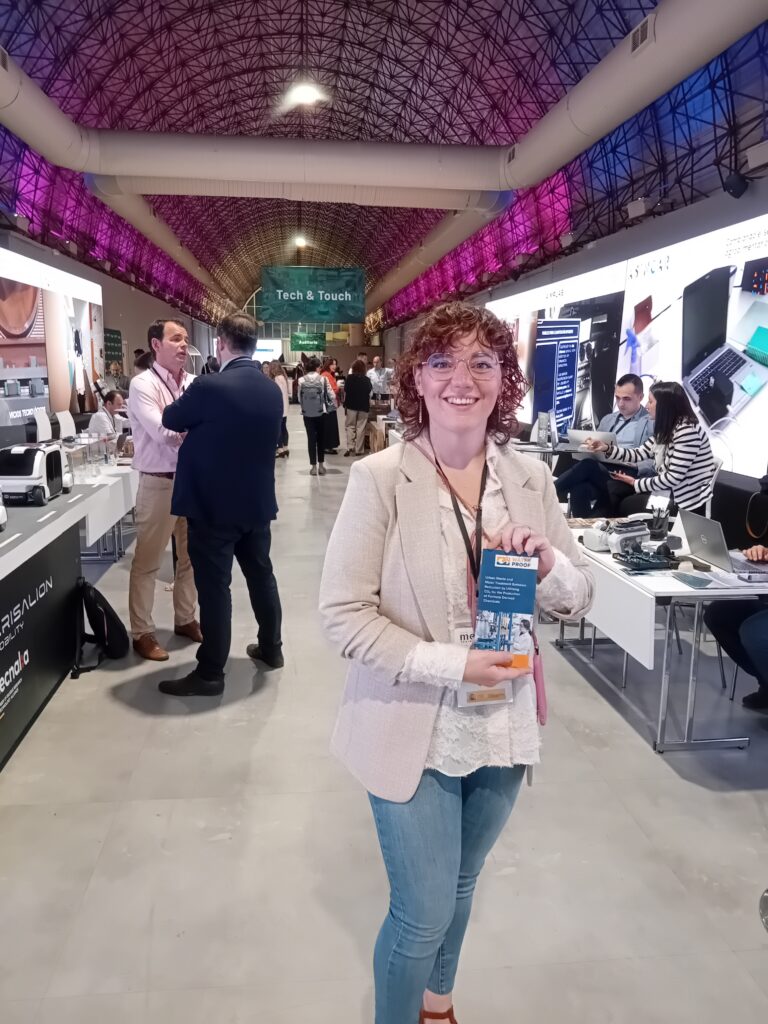
On June 13-14th, 2024, Maddalena Bettoni from Funditec presented WaterProof at MeetechSpain, an event where numerous technological centers from Spain converge to showcase their works, innovations, and project. Funditec is part of WaterProof’s WP1 in which they work on making the best use of the anodic current of the electrochemical Formate cell by studying the paired production of H2O2 for water purification.
- 29.
Apr 2024Dr. Guillermo Pozo from TECNALIA will introduce WaterProof at the IFAT Munich 2024!
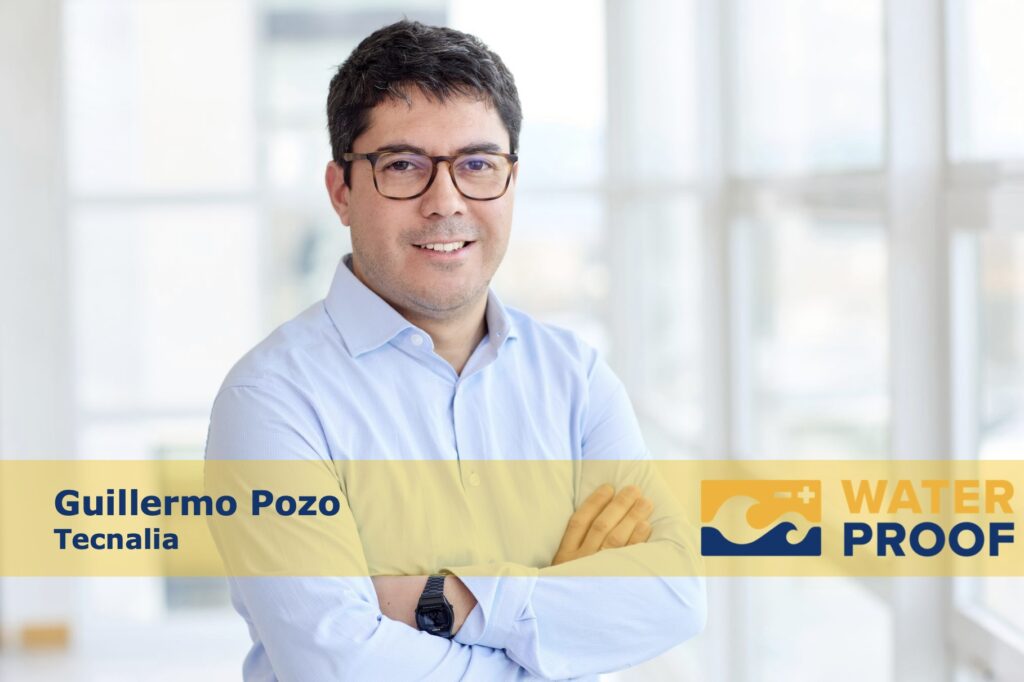
On May 15-16th, 2024, Dr. Guillermo Pozo from TECNALIA will visit and introduce WaterProof at IFAT Munich 2024, the largest international trade fair for water, wastewater, recycling, and municipal technology sectors. TECNALIA is working on WP3 (Product implementation and value chain circularity) in the WaterProof project. TECNALIA’s task focuses on using formic acid products derived from recycled CO₂, their circularity in the value chain, and their validation in synthesising acidic deep eutectic solvents (ADES) for metal recovery from waste streams.
- 12.
Apr 2024The Potential of Electrodes – Interview with Dr. Pegah Shakeri (Coatema)
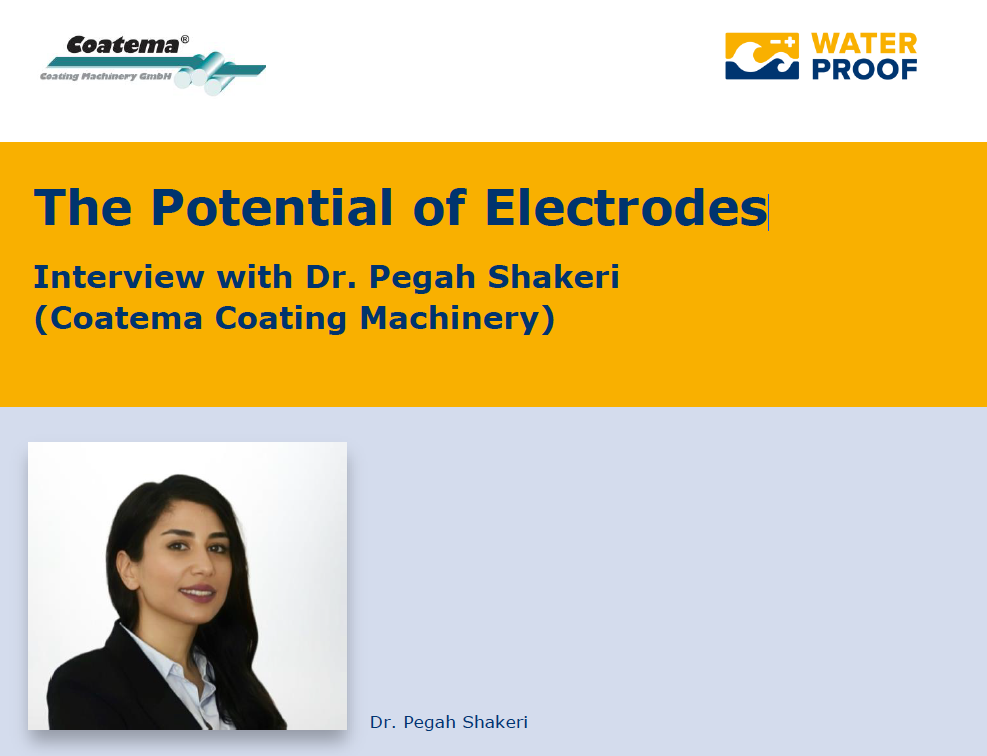
Electrochemistry and CO₂ Conversion go hand in hand.
Learn more about the potential of electrodes in our latest interview with WaterProof project-partner Coatema’s expert Pegah Shakeri, PhD. The company has great expertise in electrode production and electrochemistry.Read the full interview here.
- 11.
Apr 2024Dr. Pegah Shakeri (Coatema) to present WaterProof at the CO₂-Based Fuels and Chemicals Conference 2024
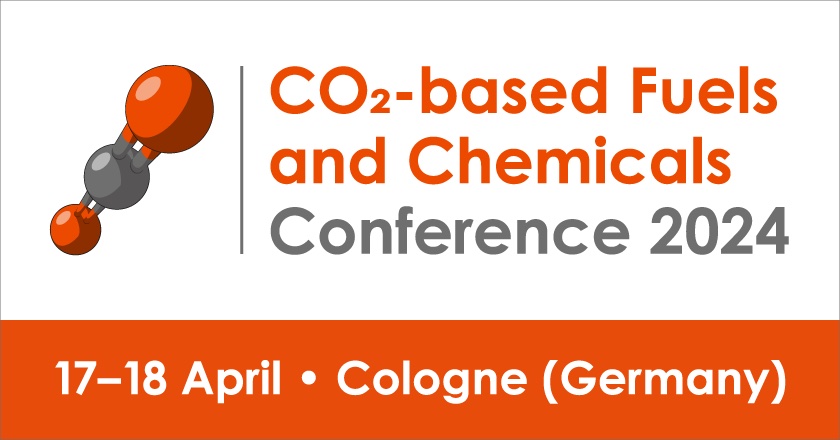
On April 18th 2024 Dr. Pegah Shakeri from Coatema will present the recent results of the WaterProof project at the CO₂-Based Fuels and Chemicals Conference 2024 in Cologne, Germany and online. The event aims to showcase advanced research in Carbon Capture and Utilisation and its potential in the field of sustainable CO₂-based chemicals and fuels.
Join us on site and explore the entire programme at: https://co2-chemistry.eu
- 22.
Feb 2024Maddalena Bettoni (Funditech) to present WaterProof at meetech 2024 in Spain
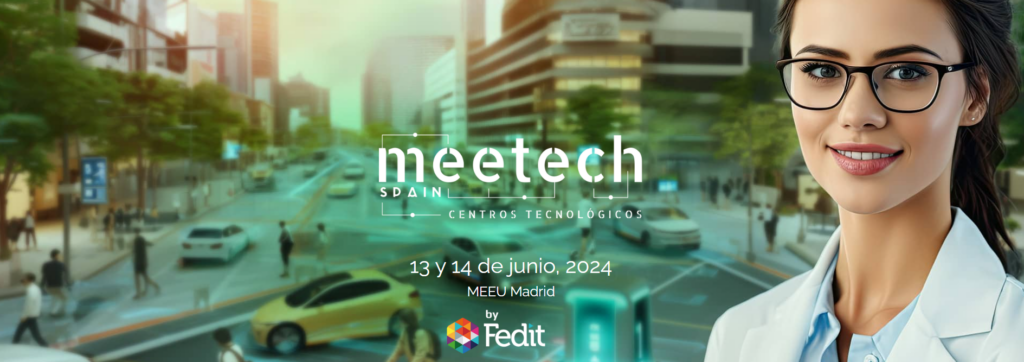
On June 13-14th 2024 Dr. Maddalena Bettoni from Funditech will introduce WaterProof at the meetech Conference 2024 in Spain, demonstrating the versatility of innvative technology and chemistry.
Find more information on the event here.
